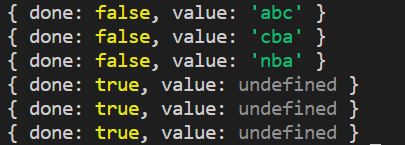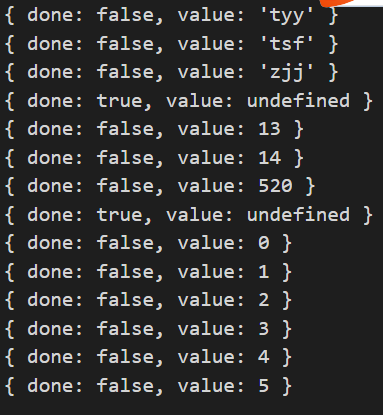迭代器
1迭代器----帮助我们对某个数据结构进行遍历的对象---有
简单实现可以对数组进行遍历的对象:
1 const names = ['abc', 'cba', 'nba'] 2 //创建一个迭代器对象来访问数组 3 let index = 0 4 const namesIterator = { 5 next: function() { 6 if (index < names.length) { 7 return { done: false, value: names[index++] } 8 } else { 9 return { done: true, value: undefined } 10 } 11 } 12 } 13 console.log(namesIterator.next()); 14 console.log(namesIterator.next()); 15 console.log(namesIterator.next()); 16 console.log(namesIterator.next()); 17 console.log(namesIterator.next()); 18 console.log(namesIterator.next());

2:上面已经实现了一个简单的数组迭代器,但是如果我们想让其他数组生成迭代器呢,我们可以构造一个生成迭代器的函数:
1 function creatrArrIterator(arr) { 2 let index = 0 3 return { 4 next: function() { 5 if (index < arr.length) { 6 return { done: false, value: arr[index++] } 7 } else { 8 return { done: true, value: undefined } 9 } 10 } 11 } 12 } 13 const names = ['tyy', 'tsf', 'zjj'] 14 const nums = [13, 14, 520] 15 const namesIterator = creatrArrIterator(names) 16 const numsIterator = creatrArrIterator(nums) 17 console.log(namesIterator.next()); 18 console.log(namesIterator.next()); 19 console.log(namesIterator.next()); 20 console.log(namesIterator.next()); 21 console.log(numsIterator.next()); 22 console.log(numsIterator.next()); 23 console.log(numsIterator.next()); 24 console.log(numsIterator.next()); 25 //创建无限的迭代器 done一直为false 26 function creatNumberItertor() { 27 let index = 0 28 return { 29 next: function() { 30 return { done: false, value: index++ } 31 } 32 } 33 } 34 const NumberItertor = creatNumberItertor() 35 console.log(NumberItertor.next()); 36 console.log(NumberItertor.next()); 37 console.log(NumberItertor.next()); 38 console.log(NumberItertor.next()); 39 console.log(NumberItertor.next()); 40 console.log(NumberItertor.next());

3:可迭代对象---我们获取一个数组时,需要自己创建索引,再创建一个迭代器对象,但是当我们对这些一起进行封装就变成了一个可迭代对象(注意与迭代器区分)
1 const iterableObj = { 2 names: ['abc', 'cba', 'nba'], 3 //返回一个迭代器 4 [Symbol.iterator]: function() { 5 //迭代器访问的是外层作用域的index所以++操作没有问题 6 let index = 0 7 console.log(this); 8 return { 9 //变成箭头函数this就去找上层作用域的this 10 next: () => { 11 if (index < this.names.length) { 12 //一个对象不是作用域 nams在外层作用域找不到全局作用域也找不到 13 return { done: false, value: this.names[index++] } 14 } else { 15 return { done: true, value: undefined } 16 } 17 } 18 } 19 20 } 21 } 22 //每次都会生成一个新的迭代器 23 console.log(iterableObj[Symbol.iterator]); 24 const iterator = iterableObj[Symbol.iterator]() 25 console.log(iterator.next()); 26 console.log(iterator.next()); 27 console.log(iterator.next()); 28 console.log(iterator.next()); 29 //for...of可以遍历的东西必须是一个可迭代对象 for..in的本质 30 for (const item of iterableObj) { 31 console.log(item); 32 }
4:原生迭代器对象---本身就是一个课可迭代对象--String,Array,Map/Set等等
1 const iterableObj = { 2 names: ["abc", "cba", "nba"], 3 [Symbol.iterator]: function() { 4 let index = 0 5 return { 6 next: () => { 7 if (index < this.names.length) { 8 return { done: false, value: this.names[index++] } 9 } else { 10 return { done: true, value: undefined } 11 } 12 } 13 } 14 } 15 } 16 //String 17 const str = "I am happy" 18 for (const s of str) { 19 console.log(s); 20 } 21 //Array 22 const arr = ['tyy', 'zjj'] 23 for (const a of arr) { 24 console.log(a); 25 } 26 const set1 = Array.from(str) 27 for (const s1 of set1) { 28 console.log(s1); 29 } 30 //Map/Set 31 const map = new Map([ 32 [{ name: 'obj1' }, "aaa"], 33 [{ name: 'obj2' }, "bbb"], 34 [1, "ccc"] 35 ]) 36 for (const m of map) { 37 console.log(m); 38 } 39 const set = new Set(iterableObj) 40 for (const s of set) { 41 console.log(s); 42 } 43 //arguments对象 44 function foo(x, y, z) { 45 for (const arg of arguments) { 46 console.log(arg); 47 } 48 } 49 foo(10, 20, 30)
5:可迭代对象的应用
1 //1:for..of场景 2 //2:展开语法 3 const iterableObj = { 4 names: ['tyy', 'tsf', 'zjj'], 5 [Symbol.iterator]: function() { 6 let index = 0 7 return { 8 next: () => { 9 if (index < this.names.length) { 10 return { done: false, value: this.names[index++] } 11 } else { 12 return { done: true, value: undefined } 13 } 14 } 15 } 16 } 17 18 19 } 20 const names = ['tyy', 'tsf', 'zjj'] 21 const newnames = [...names, ...iterableObj] 22 //3:解构赋值 23 const obj = { name: 'tsf', age: 22 } 24 const newobj = {...obj } 25 console.log(newobj); 26 const [name1, name2] = iterableObj 27 //ES9新增的一个特性 28 const { name, age } = obj 29 console.log(name1); 30 console.log(name); 31 //4:创建一些其他对象 32 const set1 = new Set(iterableObj) 33 const set2 = new Set(names) 34 35 const arr1 = Array.from(iterableObj) 36 37 // 5.Promise.all 38 Promise.all(iterableObj).then(res => { 39 console.log(res) 40 })



 浙公网安备 33010602011771号
浙公网安备 33010602011771号